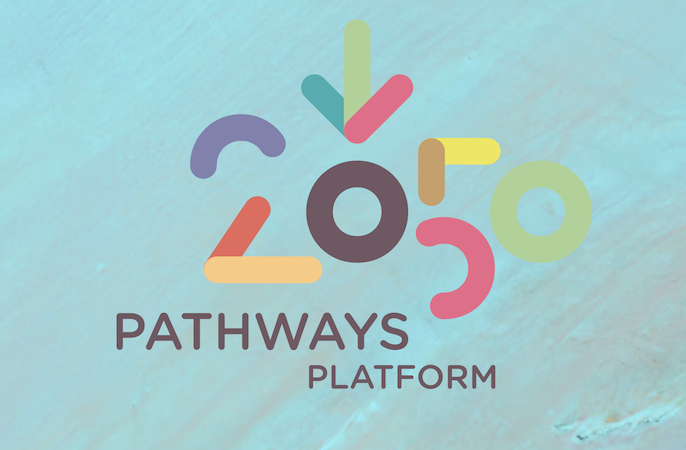
The 2050 Pathways Platform secretariat held its 2022 annual meeting in early April. The four invitation-only virtual sessions held on April 6, 7, 12, and 13 provided an opportunity for Platform member countries, partners, and guest speakers to showcase their experiences with developing long-term strategies (LTS), and to highlight some important lessons and aspects of long-term planning. Participants and observers from a range of countries and organizations enriched the discussions. Each session lasted one hour and a half and featured several presentations centered on a different theme relating to LTS. Session 1 was organized around the foundations of LTS development, while session 2 delved in on experiences and case studies in stakeholder engagement during the LTS process. Session 3 expanded on funding for LTS design, and session 4 focused on the macroeconomic, financial, and policy implications of the transition.
Session 1: Laying the foundations for long-term low-emission development strategies (LTS)
This session opened our 2022 annual meeting series, by giving a short overview of the current status of long-term strategies (LTS) worldwide and of different development stages of a country’s LTS. These stages include the foundational work, the overall LTS formulation, and the post-LTS operationalisation and implementation work. Specific focus was given on the first stage and on long-term visions as foundations of and necessities for LTS. Following the introduction from the 2050 Pathways Platform team, the session dived into how to adapt LTS to specific country contexts, with an example from SIDS and LDCs, and on how to balance out the opportunities and challenges of elaborating LTS. Moreover, the session presented best practice on two aspects of LTS that have so far been neglected slightly, adaptation and AFOLU, and a specific country case of carbon neutrality of the AFOLU sector in Argentina. Lastly, the session closed with a presentation on the role of energy sufficiency as a key enabler to build long-term sustainability.
Download Session 1 Presentations
Session 2: Engaging stakeholders in the context of long-term low-emission development strategies
An integral part of the long-term strategy development process, stakeholder engagement and communication throughout the policy creation cycle can ensure cross-societal buy-in. During the second session of the series, speakers from Peru, South Korea, Japan, and South Africa shared their country experiences for a whole-of-government and cross-societal LTS process with broad participation of stakeholders in various stages of LTS elaboration and implementation. Country representatives gave insights on ways their governments approached a participatory process at the national and local levels, through meetings of different formats, public consultations, gathering of contributions, and socialisation of documents, giving concrete examples of the types of stakeholders convened at each stage. Finally, the session concluded with an overview of how climate citizens’ assemblies have been growing in traction, showing that when carefully planned, these can be a powerful tool to engage the citizenry in the climate policy process.
Download Session 2 Presentations
Session 3: International funding for LTS design and implementation
Countries worldwide are developing long-term strategies to inform the transition to just, net-zero and climate-resilient societies. Whilst this is encouraging, many countries are yet to develop LTS that can help navigate the transition, particularly LDCs and AOSIS, which will require support from the international community. In addition, the majority of LTS submitted will require further support to define the specific medium- and short-term actions required to achieve the end objectives and to implement the transformations required. To address this gap, bilateral and multilateral development partners are expanding support areas for LTS. In this session, we learned that bilateral development agencies have dedicated support for LTS design with ongoing work in multiple countries covering all aspects of LTS design process, from visioning, and scenario modelling, to stakeholder engagement and capacity building. Development Banks are also supporting multiple aspects of LTS design and implementation using different approaches such as Policy-Based Loans, the inclusion of analytical information on the transition in country analysis, generation of relevant research, south-south exchanges, and mechanisms such as the Climate Support Facility, the Deep Decarbonization Pathways LAC program and a joint MDBs LTS Facility under discussion. All partners underlined that LTS can inform ambitious NDC revisions, policy reforms and financing approaches to mainstream climate action into development planning. In addition, speakers highlighted the need to enhance support for in-country coordination and to increase funding available, particularly in regions with a lack of capacity.
Download Session 3 Presentations
Session 4: Policy and development planning: the macro-economic and financial implications of the transition
Most long-term strategies to date have focused their modelling work on the – much needed – description of what economies and societies would look like without greenhouse gas emissions by the middle of this century. The question of how to get there requires that countries face the macro-economic aspects of the transition. This includes anticipating the socio-economic repercussions of sectoral changes, the unavoidable redistributive impacts as households invest in fossil-free energy solutions, and myriads of budgetary decisions to adjust fiscal measures, creating incentives for a swift transition and removing subsidies to GHG-emitting practices. The session described the many elements of this critical dimension of policymaking, the importance of getting the early involvement of Ministries of Economy and Finance with the use of dedicated indicators as part of the LTS elaboration. Last but not least, the session stressed that climate change itself is already having, and will increasingly have impacts on economies as well, which must also be reflected in the projections of socio-economic development to the middle of this century.
Download Session 4 Presentations
Sorry, the comment form is closed at this time.